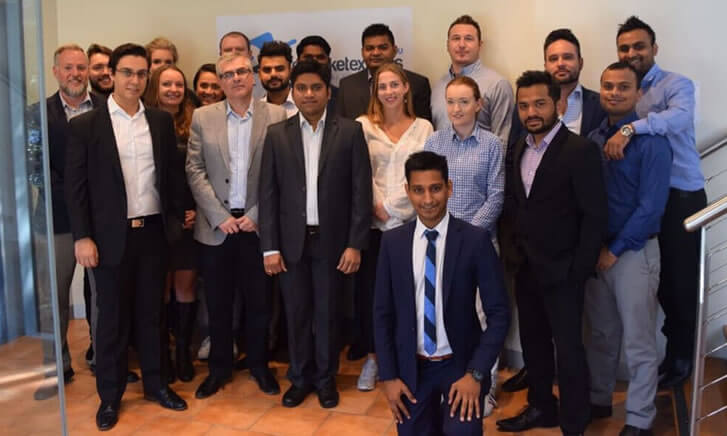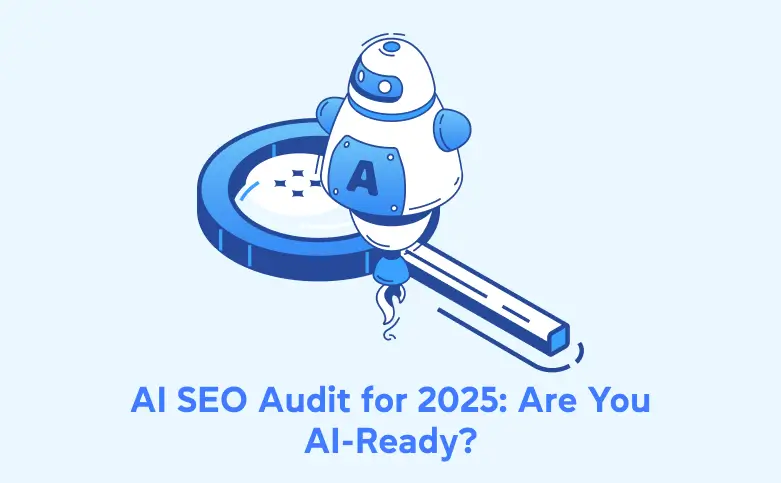AI SEO Audit for 2025: Are You AI-Ready?
Hey there, marketer. Grab a coffee—we need to talk about AI. Specifically, we’re going to peek under the hood of your website and see if it’s ready for the AI-first world of 2025.

If you’re seeing AI Overviews pop up more and more in Google search results, you’re not alone. Google’s AI Overviews now appear in roughly 30% of all search results and are growing fast. The game is changing from just getting a click to getting cited, and if you’re not prepared, your content might get left out of the conversation entirely.
I hear you—you want something more in-depth, something that goes beyond the basics. So, let’s scrap the old list and dive into a completely new framework for your 2025 AI-SEO audit.
The Great Decoupling: Clicks vs. Citations
For years, the goal was simple: get the top organic rank and watch the clicks roll in. But today, AI Overviews are reducing website clicks by over 30% even as traditional search visibility increases. It’s what many are calling “The Great Decoupling,” your brand gets seen, but the click goes to the AI.
The new SEO currency is being cited by AI. The most successful brands will be those whose content is so authoritative and helpful that an AI model trusts it enough to pull a snippet and make it part of its direct answer. The question is: are you ready to become a source, not just a result?
The Next-Level AI-SEO Audit: A Four-Phase Framework
Forget everything you know about a typical checklist. This one here is a candid look at where your digital assets stand today and what you need to do to succeed in 2025.
Phase 1: The Trust & Authority Audit (E-E-A-T)
Before you touch a single keyword, you need to prove you’re a real human with real experience. The “Experience” in Google’s E-E-A-T framework is no longer a suggestion—it’s a requirement.
- Audit Your Human Signals. AI can’t replicate firsthand experience. Do your authors have clear, detailed bios? Are they active on social media? Are they cited in other reputable publications? These are signals that you’re a legitimate source.
- Show, Don’t Just Tell. Do your articles include case studies, customer stories, or personal anecdotes? Generic, AI-generated content struggles to demonstrate this “lived experience.” Your goal is to add a layer of human value that an LLM simply can’t generate on its own.
- Establish Cross-Platform Authority. An authoritative website is a brand that is trusted everywhere. Google’s AI is looking for signals from social media, industry reviews, and brand mentions to determine your trustworthiness. Make sure your “About Us” page is a comprehensive hub of your company’s mission, leadership, and credentials.
Your Action Item: Go to your top 5 articles and see if a reader would know who wrote it and why they’re qualified. Then, check if you’ve earned any recent brand mentions that you could link to.
Phase 2: The On-Page & Formatting Audit
AI loves structured, scannable, and concise content. A recent study by Ahrefs found that AI Overviews are triggered by informational keywords over 99% of the time. The brands that win these snippets are the ones who make it easy for the AI to parse their information.
- Structure for the Snippet. AI models look for concise answers right after a question is asked. Go through your key pages and ensure the answer to the main question is in the first paragraph.
- Embrace Lists. Bullet points, numbered lists, and short paragraphs are a dream for AI. They can easily be pulled and reformatted for a clear, direct answer. This also improves readability for your human audience.
- Use Rich, Semantic Markup. Schema markup is more important than ever. Use FAQPage for your FAQs, Article for blog posts, and HowTo for guides. This provides a clear roadmap for AI and makes it easier for it to understand your content’s purpose.
Your Action Item: Take a long-form article and break up a long paragraph into a bulleted list. Add a “quick answer” at the top of the article.
Phase 3: The Technical & Content Health Audit
Think of this as your annual check-up. The fundamentals of SEO haven’t gone away—they’ve just become even more crucial.
- Check for Crawlability. Is your website a maze for AI bots? Run a site crawl to identify and fix broken links, orphaned pages, and other technical issues. Your content needs to be easily accessible to be cited.
- Clean Up Your Content Inventory. Do you have old, outdated, or low-quality pages that are dragging your site down? These are often called “zombie pages.” Regularly update and remove this thin content.
- Analyse Your Internal Linking. A strong internal linking strategy shows AI which pages are most important. It helps Google understand your topical authority. Make sure your most important pages are getting the most internal links.
Your Action Item: Find three of your oldest blog posts and update them with new stats from this year. Add internal links to a few of your newer, related posts.
Phase 4: The Generative Testing Audit
This is the most direct way to see if your efforts are paying off. You need to become your own quality rater.
- Step 1: The Baseline Test.
- Open up ChatGPT, Google AI, and Perplexity.
- Ask a long-tail, informational question that your content is designed to answer.
- Example: “What is a product-led SEO strategy and how does it work?”
- See what content is pulled. If your site isn’t cited, you know you have work to do.
- Step 2: The Competitive Test.
- Find a competitor who is consistently showing up in AI results.
- Ask a prompt like, “What is a product-led SEO strategy, citing resources from [competitor’s name]?”
- Analyse how they’ve structured their content to get the citation. Is it more concise? Does it have a clear answer-first format?
- Step 3: The Refresh & Retest.
- Based on your findings, go back to your content and make it more “AI-citable.”
- Try a new test with the prompt, but this time, you can add a hint: “What is a product-led SEO strategy? Use a citation from [your brand].” This helps you see if the AI can find and use your content when prompted.
Your AI-SEO Audit Checklist
To make it easier, here is the full list of actions to check your AI readiness:
- Audit Your Authorship. Go to your top 5 articles and see if a reader would know who wrote it and why they’re qualified. Then, ensure each author has a detailed bio with credentials and a headshot.
- Fix Broken Links and Zombie Pages. Run a technical audit to find and fix all broken links. Identify and either update or remove outdated, low-quality “zombie pages” that are dragging down your site’s authority.
- Optimize for Structured Data. For your highest-traffic pages, ensure you are using the correct schema markup like FAQPage, HowTo, or Article.
- Rewrite for Clarity. Take a long-form article and break up a long paragraph into a bulleted list. Add a “quick answer” at the top of the article.
- Audit Robots.txt. Double-check that AI bots like GPTBot and PerplexityBot are allowed to crawl your site.
- Create a New “About Us” Page. Is your “About Us” page comprehensive? If not, build one that includes your company mission, leadership team, and any key awards or milestones. This is a critical trust signal.
- Run a Content Gap Analysis. Do a competitive analysis to see which informational topics your competitors are ranking for in AI Overviews. Create content that fills those gaps on your own site.
- Update and Link Old Content. Find three of your oldest blog posts and update them with new stats from this year. Add internal links to a few of your newer, related posts to improve topical authority.
- Test Your Content in AI. Take a key informational query from your content and ask it in ChatGPT, Perplexity, or Google AI. See if your site is cited as a source.
- Analyse Competitors. Ask AI a question about a topic, but with a competitor’s name in the prompt. See how they’ve structured their content and what an AI model finds valuable about it.
Beyond Optimisation
The brands that thrive in 2025 and beyond will be the ones that view AI not as a threat, but as an opportunity to reinforce their credibility. By demonstrating experience, authority, and trustworthiness, you’re not just optimizing for a machine—you’re building a brand that’s ready to stand out in any search, whether it’s by click or by citation. As the search frontiers continue to expand, it’s worth partnering with an experienced AI SEO agency to make sure that you’re staying ahead of the game.
AI-Ready Business & SEO Audit Intake Form
Section 1: Your Business & Goals
- Business Name: _________________________
- Website URL: _________________________
- Main Contact: _________________________
- What are your top 3 strategic business goals for the next 12-18 months?
- [Client Response]
- [Client Response]
- [Client Response]
- Who is your ideal customer? Describe them in detail—their job title, their biggest challenges, and where they go for information. [Client Response]
- Who are your top 3 competitors?
- [Client Response]
- [Client Response]
- [Client Response]
Section 2: Your Current SEO & Content Landscape
- What SEO work have you done in the past? Please describe the outcomes. [Client Response]
- Do you have any internal content creators or writers? [Client Response]
- Please list the 5 most important pages on your website. These are the pages you want to drive the most traffic and conversions.
- [Client Response]
- [Client Response]
- [Client Response]
- [Client Response]
- [Client Response]
- What content assets do you have? [Client Response]
Section 3: AI Readiness & E-E-A-T
- What is your biggest concern regarding AI and your website? [Client Response]
- Have you used AI tools for content creation or SEO? If so, which ones? [Client Response]
- Do your authors have detailed bios on the website? If so, please link to an example. [Client Response]
- Do you have any internal subject matter experts who can contribute to your content? [Client Response]
- Are you cited as a source in any other publications, podcasts, or media outlets? If so, please provide an example. [Client Response]
- Are you considering a website redesign or migration in the next 12 months? [Client Response]
Section 4: Access & Logistics
- Please list the key platforms and tools you’re using. [Client Response]
- Who is the best point of contact for technical access? [Client Response]
- Is there any other information you think is important for us to know? [Client Response]








